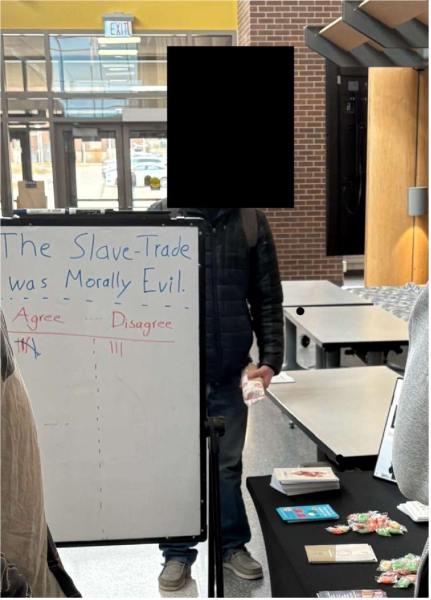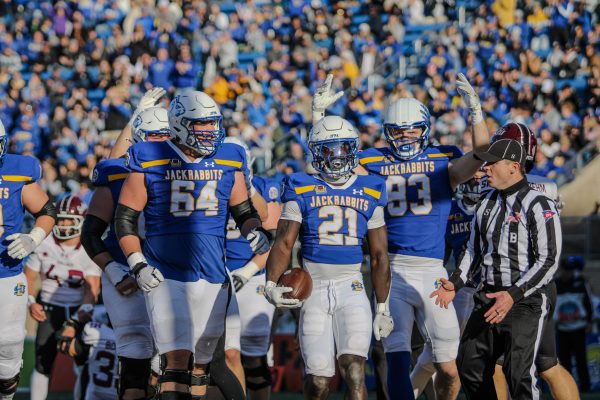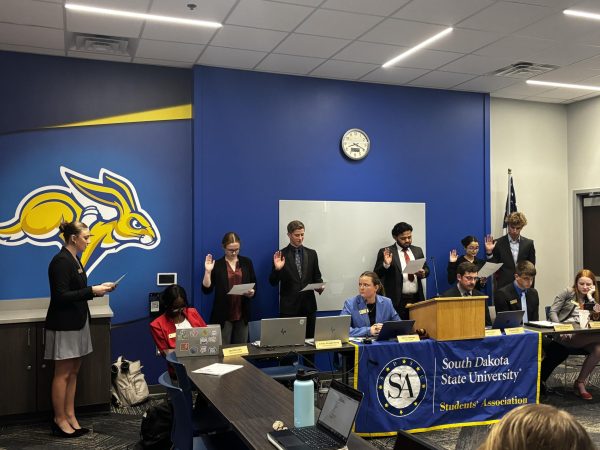What is the Students? Association?
February 8, 2011
Kristine Young News Editor
Students across SDSU’s campus often find themselves wondering what the Students’ Association is and what the group does.
Brett Monson, SA president, said SA is made up of three advisers, an executive board and 28 senators. The advisers to SA are Marysz Rames, vice president for student a_ airs, Dan Hansen, assistant dean for student services in the college of pharmacy and Zeno Wicks III, plant science professor.
Hansen said the role of the advisers is to be a resource to the members of SA.
“We are 100 percent just a resource. We’re not there to write legislation or tell them what to do,” he said. “Once they’ve identified what they want to accomplish, I’m there to answer any questions, help them set up meetings, and line them up with the right people.”
According to Monson, the president and vice president are elected every year in March and they appoint the other members of the executive board. The executive board consists of the president, vice president, financial chair, administrative assistant, and the state and local government committee chair.
“We (the president and vice president) are the foundation for our team and we work with the rest of the executive board and senators to make a cohesive unit,” Monson said. Anyone who wants to become a senator has to get at least 50 signatures from students of their own college. Once they have 50 signatures their name can be put on the ballot.
“This is important to verify that the students who wish to be put on the ballot are in their college and that students support them being on the ballot,” said Anthony Sutton, SA senator and finance chair.
Monson said senators hold a variety of responsibilities.
“Senators are required to serve on at least one committee and have two office hours a week, as well as attend Monday night SA meetings. They also have to go to one Board of Regents meeting or Students for Higher Education Days in Pierre,” Monson said.
Monson said when a senator position is open for whatever reason, a senator-at-large is then appointed to _ ll the position.
SA runs o_ of funds generated from the general activity fee. Currently, students pay $25 per credit for the general activity fee. Monson said SA gets $70,000 from the general activity fee for office supplies, scholarships for executive board members, and travel. SA also distributes about $2.4 million of these funds to other student organizations, such as UPC and student clubs.
SA also works closely with a variety of administration on campus. Hansen said members of SA are given time on a regular basis to sit down with members of administration to discuss issues and give their input.
“[SDSU President David] Chicoine and other administration have done really well at making sure that students always have a voice in decisions, which is not the case at most universities,” Hansen said. “It’s something that, at least since I’ve been here, we’ve always had the luxury of having.”
Students also interact with administration on campus through a variety of committees.
“Almost every committee on campus has one to two student representatives, with some being made up of over 50 percent student members,” Rames said. “They are our pipeline to make sure student input and feedback is heard.”
Hansen said that administration works hard to incorporate student opinion into their decisions and “depending on the issue,” SA holds a lot of influence.
“When dealing with an issue that affects more than just the students they are more just part of the information gathering, but when it’s an issue that only affects student they play much more of a role in the decision,” he said.
Monson said that despite SA’s influence, in the end, Chicoine makes the decisions.
“We can’t just go into President Chicoine’s office and say “OK. You need to do this,” Monson said. “In the end, he says “yes’ or “no’ with virtually everything in the university.”
Monson said SA has been influential in a variety of decisions on campus. He mentioned the bike sharing program that will start this spring, the Wellness Center and Student Union expansions, and the student discount club as a few of SA’s accomplishments.
Monson, Hansen and Rames encourage everyone to get involved with SA.
“Student government plays an important role on campus and it’s a real opportunity to be heard,” Rames said. “It’s a very exciting and rewarding experience and it plays an important role in what we do at the university. For anyone that wants to be involved, they won’t be disappointed in their experience.”
For any students who wish to run for a senate seat, the deadline to file is Feb. 14.





















